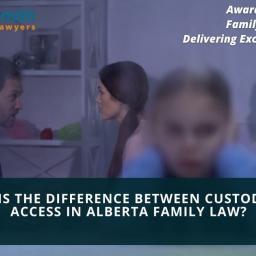DIVORCE: WHO GETS WHAT IN ALBERTA
Divorce does not have to be ugly. Believe it or not, it is possible to get through a divorce cordially, calmly, and cooperatively, with little or no fight. Our award-winning team of experienced lawyers at Osuji & Smith Lawyers has a wealth of experience in Divorce Law, Child Custody, and Child Support. We can simplify your complicated and somewhat scary situation by walking you step by step and outlining who gets what at the end of the marriage.

The Family Property Act (FPA) is a key piece of legislation in Alberta that governs how matrimonial property is split when a marriage ends. Note, the province of Alberta recognizes marital property to include the following:
- Matrimonial Home
- Most land or real estate attained during a marriage-with some exceptions
- Bank Accounts
- Vehicles
- Pensions
- Insurance
- Recreational Property
- Stocks, deposits, and bonds
Under the FPA, property that is excluded from division in the demise of a marriage include the following:
- Assets owned before the marriage
- Inherited assets
- Proceeds from a personal injury lawsuit
- Property received from a third party
- Insurance proceeds
In determining who gets what in Alberta, the court will examine all the assets and debts the husband and wife have accrued during the marriage whether individually or jointly, or in company names. The Court will also examine the assets acquired through inheritance such as land and chattels, a gift from a third party (for example expensive jewelry gifted by in-laws), and exempt property. This article will explain how assets are divided in Alberta at the end of a marriage.
WHO KEEPS THE MATRIMONIAL HOME?
The most significant asset that a couple owns during their marriage is usually the matrimonial home. To be considered a matrimonial home under the FPA, the property must be situated in Alberta and must be leased or owned by one or both of the parties. Also, the matrimonial home must be occupied by the husband and wife at some point during their marriage. The FPA recognizes the following types of property as a matrimonial home:
- House or part of a house
- Apartment Condominium or a suite
- Mobile home
Unless the matrimonial home is owned jointly by the husband and wife, there is no right to ‘half’ of the home but instead, a right to have whatever equity lies within the home included in the property/asset division. It does not matter whose name is on the house documents, both parties have an equal right to remain in the matrimonial home. In other words, until a divorce or court order is granted, both parties have the right to live in the matrimonial home pursuant to the Dower Act.
WHO GETS THE CHILD AFTER DIVORCE?
Usually, legal custody of the child/children is granted to both parents which means both parents have equal right to make child-rearing decisions, but in certain cases where the divorce is messy and parents do not agree with each other, the court grants joint legal custody to any one of the parents.
When a parent has sole or joint custody of the children, issues sometimes arise when that parent wants to move and take the children with him or her. The other party would most likely not want the parent who has custody to move to a distant place because it makes regular visitation difficult or impossible. The Supreme Court of Canada in Gordon v Goertz determined that a custodial parent cannot automatically move a child anywhere without the other parent’s approval or a court order (Mobility Order). Under the federal and Alberta laws, the decision to allow a child to be moved must be made in the best interest of the child.
WHO IS RESPONSIBLE FOR MATRIMONIAL DEBTS INCURRED AFTER DIVORCE?
If you accumulated a lot of debt during your marriage, it is important to understand that the party who borrowed the money is the one responsible for repaying the debt after the divorce. It is inconsequential to the creditor if the debt is in the name of one party, but the other party spent the money. The person’s name on the account is the person responsible for paying back the money borrowed.
A joint debt, on the other hand, is one where both the husband and wife have co-signed or where one party has guaranteed the other party’s credit if it was poor to acquire a loan on their own. Each person whose signature is on the debt contract shares equal liability for the debt at the end of the marriage. In Alberta, marital property includes assets acquired during the marriage and matrimonial debts incurred after separation. In a nutshell, if the debt was incurred during the marriage, and for the benefit of the marriage, then that debt is divided equally with your spouse regardless of whether the debt is in your name, joint names, or your spouse’s name alone.
If your spouse brought debt into the marriage which still exists after the divorce, you will not be responsible for repaying any portion of that outstanding debt. The balance that remains will be their sole responsibility to repay.
WHO GETS THE PETS IN A DIVORCE?
In Alberta, the law treats pets as personal possessions-like a chair or television and are treated as such in a divorce. This means that the best interests of the pet are not relevant in deciding who keeps it. In Baker v Harmina, the court recognized that unlike ‘the best interest of the child test’ applied for child custody applications, pets are, in the eyes of the law, an item of personal property. That doesn’t mean that dogs are not important but means that when two people disagree about who should get the dog, the question is not about who has the most affection for the dog or treats it better. The question is who owns it?
The law relating to pet custody is dicey in Alberta and Canada as a whole. Canadian courts are reluctant to delve into pet custody because there are limited public resources, precedence, and case law on this, so it is better to seek Alternative Dispute Resolution such as Mediation or Arbitration when trying to resolve disputes surrounding custody of family pets.
Please contact Osuji & Smith lawyers for assistance on your family legal matters.
Author – Lydia Iboko




